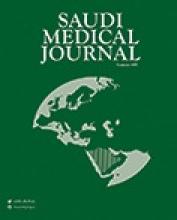Abstract
Objectives: To avoid hospital spread of Coronavirus-2019 (COVID-19) and to analyze out of hospital outcomes after amputation.
Methods: Prospective analysis of data obtained from 60 diabetic patients in 2020 was performed at Cantonal Hospital Zenica, Zenica, Bosnia and Herzegovina. Personal protection equipment included double surgical mask, glasses, disposable surgical coats, and surgical masks for patients. Swabs were used to take samples from wounds. We randomly divided patients in 2 groups of 30 patients each. In pre-operative treatment, we used local anesthesia lidocaine hydrochloride 2% (Belupo, Koprivnica, Croatia) in group A and systemic analgesia intravenous tramadol chloride 100 mg intravenous (Krka, Novo Mesto, Slovenia) in group B. Wounds were surgically treated each day and heal spontaneously. Periodical control exams were performed.
Results: Wound healing did not present any statistically significant differences between groups (group A: 69±21.97 and B: 61±22.13 days, t=−1.22; p=0.11). No statistically significant differences (p<0.05) between groups A and B in wound healing regarding to gender or cigarette use was noted.
Conclusion: No significant differences in amputation treatment between the 2 comparative groups were noted. No confirmed COVID-19 infections in medical staff who performed surgical interventions or in treated patients were detected.
Footnotes
Disclosure. Authors have no conflict of interests, and the work was not supported or funded by any drug company.
- Received November 17, 2020.
- Accepted December 30, 2020.
- Copyright: © Saudi Medical Journal
This is an open-access article distributed under the terms of the Creative Commons Attribution-Noncommercial License (CC BY-NC), which permits unrestricted use, distribution, and reproduction in any medium, provided the original work is properly cited.






